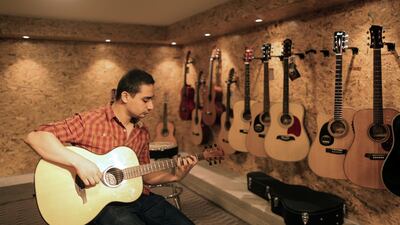A 12-year-long blockade means getting access to new musical instruments in Gaza can be difficult. Everything has to come in via the border crossing with Israel and needs approval from the authorities. This green stamp, unsurprisingly, can take a long time to secure.
It's particularly difficult to bring in a piano, music shop owner Raji Al Jaru, 27, explains. "We can bring in any instrument except the piano, because of its huge size," he tells The National. "These instruments can be damaged if they're left for a long time under the sun. And that's happened, because it was seized at the border until the Israeli authorities gave approval for it to enter Gaza."
Al Jaru, who opened the first music shop in the self-governing Palestinian territory with his father in 2017, imports a wide range of instruments via the Rafah Border Crossing, which is under Egyptian control, or through the Kerem Shalom border, which is managed by the Israel Airports Authority. While the approvals to bring things across the border can be tough and tiresome to get, this isn’t the biggest obstacle in the way of the people of Gaza getting access to pianos, Al Jaru explains.
The hardest thing is actually raising the funds to pay for such an instrument, and that’s why he doesn’t have a single one in the shop – because they’re just so expensive. Keyboards, which he does have, cost between $80 to $270 (Dh295 to Dh990), he explains. The cost of pianos he couldn’t even begin to fathom.
The border blockade also means it's difficult for the shopowner to travel abroad and fix the instruments he buys. "I feel that I am paralysed because I can't go to buy the instruments myself, and at the same time I will risk my money, because I must buy the instrument without fixing them."
It may be a vicious cycle and running a music shop is a tough gig in Gaza, but at least it’s better than what he was doing before that, he says. “I graduated from commerce college as an accountant, but I didn’t find any work opportunities, so I thought it would be best for me to start my own business. And because I love music, I chose to open a store to sell musical instruments.”
Al Jaru is also a self-taught musician – "I learnt how to play music from YouTube" – and his instrument of choice is the traditional oud. Luckily, this and the guitar are easy to import, he says, because they're affordable (about $100 to $250).
He tells us that "interest in music is increasing with time" in the Palestinian city, but that instruments still need to be made more accessible and affordable.
“People want to learn,” he explains, “but unfortunately the number of people who can actually afford to buy instruments is limited because of the bad economic situation.”

